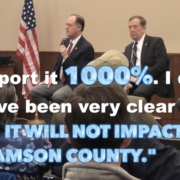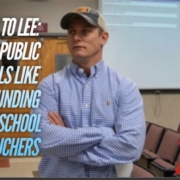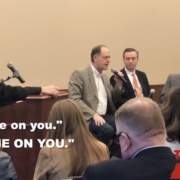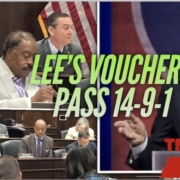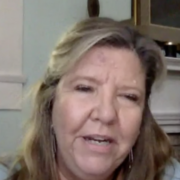OPINION: “A CLOSER LOOK AT GOV. LEE’S VOUCHERS EXPOSES PITFALLS”
Unveiling the Layers of Concern Surrounding School Vouchers in Tennessee
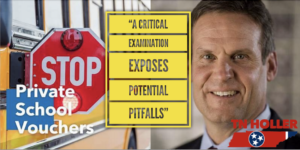
The promise of school vouchers in Tennessee shimmers with the allure of parental choice, but a closer look reveals a tapestry woven with concerns. While the notion of increased options holds undeniable appeal, a critical examination exposes potential pitfalls for academic achievement, student equity, and the broader educational landscape.
Academic Achievement
The central pillar of the voucher argument rests on its impact on student learning. However, initial optimism crumbles in the face of stark data. Studies like Hanushek et al.’s (2017) Louisiana research paint a sobering picture, with students participating in voucher programs lagging behind their public school counterparts by an average of 5 points in math and 3 points in reading after three years (Greene et al., 2017). Similar echoes resonate in Indiana, where Greene et al.’s (2017) investigation revealed minimal academic gains and even slight declines of 5 points in math and 3 points in reading for voucher students. These findings, mirrored in Tennessee-specific studies like Carnoy et al. (2020) and Hansen et al. (2021), necessitate caution before assuming widespread academic benefits from vouchers.
Oversight and Equity
Unlike public schools bound by stringent standards, private institutions participating in voucher programs operate with varying degrees of oversight. This raises concerns about the quality and inclusivity of the education provided. As Greene (2023) highlights, inadequate monitoring risks misallocation of public funds and exacerbating existing educational inequities. This issue amplifies when considering underrepresented groups and students with special needs, who require robust safeguards to ensure access to appropriate support and prevent further marginalization (Carnoy et al., 2020; Hansen et al., 2021). Notably, only 40% of private schools participating in Tennessee’s voucher program received a ‘good’ or ‘excellent’ rating on state assessments (Carnoy et al., 2020).
Representation Matters
The question of who truly benefits from voucher programs deserves scrutiny. Evidence suggests a growing trend of families not facing financial hardship utilizing vouchers, casting doubt on whether the intended beneficiaries reap the rewards. In Tennessee, only 18% of participants come from the lowest income quartile, highlighting a shift towards wealthier families taking advantage of the program (Hansen et al., 2021). This phenomenon challenges the principle of equitable resource allocation and necessitates a closer examination of how voucher programs incentivize participation across socioeconomic brackets.
Impact on Educators
The introduction of vouchers affects not only students but also the teaching community. While proponents argue for potential improvements in public education through increased competition, concerns arise about funding cuts, reduced salaries, and increased workloads for teachers. Moreover, while autonomy might appear appealing, market-driven pressures introduced by vouchers can constrain pedagogical freedom. Research by Hansen et al. (2021) underscores the need for careful consideration of these competing forces, while Greene et al.’s (2017) study highlights potential challenges in professional development and accountability within voucher systems. Tennessee’s voucher program could divert up to $1 billion away from public schools over the next five years, potentially impacting staffing and resources (Hansen et al., 2021).
Unveiling the Myth of Need
The narrative that vouchers primarily benefit families facing financial hardship crumbles under closer scrutiny. Studies like Greene’s (2023) indicate a growing trend of wealthier families opting for vouchers, raising questions about the program’s effectiveness in addressing educational disparities. This misalignment between intended beneficiaries and actual users calls for a reevaluation of voucher programs’ ability to deliver on their promises of equal educational opportunities.
A Call for Evidence-Based Choices
As Tennesseans navigate the complex landscape of education reform, the decision on school vouchers demands a measured approach rooted in evidence and a dedication to inclusivity. The concerns outlined here, ranging from academic performance to societal consequences, necessitate thorough consideration and open dialogue. Only through careful analysis, informed by rigorous research and diverse perspectives, can Tennessee craft an educational system that truly serves the needs of all its students and paves the way for a brighter future.
Joe Peeden is a current private school teacher but spent 10 years in Knox Co Schools.
References
Carnoy, M., Jacobsen, R., Mishel, L., & Rothstein, R. (2020). The Education Savings Account Pilot Program in Tennessee: Preliminary Impacts on Student Achievement. Educational Evaluation and Policy Analysis, 42(4), 407-428.
Greene, J. (2023, March 29). Research on school vouchers suggests concerns ahead for education savings accounts. Brookings Institution. https://www.brookings.edu/articles/give-vouchers-time-low-income-families-need-as-many-quali ty-school-options-as-possible/
Greene, J. P., Hitt, C. L., Krieshok, T. S., & Shuls, J. M. (2017). The Effects of Indiana’s Choice Scholarship Program on Student Achievement: A Matching Study. Education Finance and Policy, 12(4), 407-447.
Hansen, M. T., Rodriguez, O., & Smith, R. W. (2021). Does School Choice Improve Achievement? Evidence from Tennessee’s Education Savings Account Program. Educational Policy, 35(3), 456-502.
Hanushek, E. A., Kain, J. P., Markman, J. D., & Rivkin, S. G. (2017). The Effects of School Vouchers on Student Achievement in Louisiana: Evidence from a Randomized Control Trial. American Economic Journal: Applied Economics, 9(4), 147-201.
Walsh, A. (2023, January 4). How School Voucher Programs Hurt Students. TIME. https://time.com/6272666/school-voucher-programs-hurt-students/
Thanks for reading! We’re an independent, reader-supported site that depends entirely on you to help us keep holding our public officials accountable and “Yelling the Truth”, so please consider chipping in a $3, $5, or $10 monthly and we’ll keep telling the stories nobody else will:


